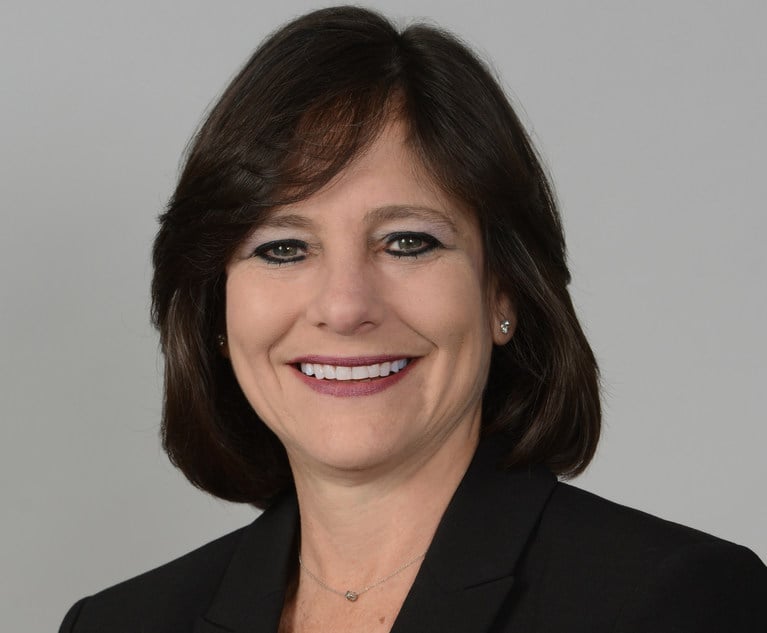 Neal Katyal, partner, and Katie Wellington, associate, Hogan Lovells
Neal Katyal, partner, and Katie Wellington, associate, Hogan LovellsDaily Dicta: How Hogan's Neal Katyal Aces Back-to-Back Appellate Arguments
In some ways, it's a problem many lawyers wish they had—how to juggle multiple appellate arguments.
January 22, 2019 at 01:24 PM
8 minute read
Hogan Lovells associate Katie Wellington will make her first appellate argument on Tuesday, appearing before the U.S. Court of Appeals for the Tenth Circuit in Denver on behalf of Ford Motor Company in a suit involving wrongful death claims and the statute of limitations.
It's a career milestone, the culmination of years of training and hard work by the former clerk to U.S. Supreme Court Chief Justice John Roberts Jr. and (then) D.C. Circuit Judge Brett Kavanaugh.
But don't expect her to cut loose and relax once it's over. Because eight days later, Wellington is due in Cincinnati to appear before the U.S. Court of Appeals for the Sixth Circuit in Samarripa v. Ormond as court-appointed counsel. The case addresses an issue on which the circuits have split—do courts have discretion to impose a partial filing fee on habeas petitioners?
“I'm really excited. I feel extremely fortunate to have the opportunity to argue two courts of appeal arguments as a mid-level associate,” Wellington said.
That it's happening so close together … well, that's not actually uncommon for members of Hogan's appellate practice. Two years ago, practice co-head Neal Katyal had to argue two U.S. Supreme Court cases a day apart; and twice more in that same year, he argued two different Supreme Court cases a week apart from one another.
It's not just him. Appellate co-head Cate Stetson last year went to Omaha to argue Vallejo v. Amgen in the Eighth Circuit on May 15, then returned to Washington for Amgen v. Azar in the D.C Circuit on May 17. The next day, she was in Atlanta before the Eleventh Circuit for Health First Inc. v. Capitol Specialty Insurance Corp., then off to Chicago for Kleen Products v. Georgia-Pacific before the Seventh Circuit on May 23—four arguments (and 5,000 miles) in eight days.
 Other firm lawyers have been in the back-to-back hot seat as well. For example, Sean Marotta on December 10, 2018 argued Comptroller of Maryland v. Wynne in Maryland Circuit Court, followed the next day by Bandemer v. Ford Motor Company before the Minnesota Supreme Court.
Other firm lawyers have been in the back-to-back hot seat as well. For example, Sean Marotta on December 10, 2018 argued Comptroller of Maryland v. Wynne in Maryland Circuit Court, followed the next day by Bandemer v. Ford Motor Company before the Minnesota Supreme Court.
Also in December, associate Mitch Reich appeared before the D.C. Circuit on the 17th to argue S.M.S.R. v. Trump and again three days later for Micula v. Government of Romania.
And last week, partner Jess Ellsworth was before the Federal Circuit arguing Autobody Parts Association v. Ford Global Technologies on Jan. 8, followed by a trip the Third Circuit on Jan. 10 for United States ex rel. Bookwalter v. University of Pittsburgh Medical Center.
In some ways, it's a problem many lawyers wish they had—how to juggle all these awesome appellate arguments?
To be sure, Hogan's appellate practice group substitutes other lawyers when it's feasible or even asks the court to reschedule. But when a lawyer like Wellington has been living and breathing a case from the beginning, Katyal said it wouldn't be right to give her argument away to someone else just because of tight scheduling.
So how—in a nitty-gritty, practical sense—do the litigators actually do it? From keeping the facts and case cites straight to remembering this time if you're appearing on behalf of the appellant or appellee?
Katyal likens it to high school or college, when you take final exams one after another—history in the morning, biology in the afternoon; English the next day, then calculus, then French (My daughter is a junior in high school. That was her December finals schedule. I pitied her.)
“As adults, we generally don't have that kind of compressed schedule,” said Katyal (who also has a child in 11th grade.) “But it's something we've done in our lives many times.”
In preparing for back-to-back appellate arguments, he advises focusing on the second argument first. But then a week or two out, drop it and dive 100 percent into the first one. As soon as that's over, you turn around and cram for number two.
Katyal is also mindful of the physical toll. “I don't drive on the day of an argument, I take Uber,” he said. “And I make sure to get some exercise.”
What about sleep? “The sleep piece is really important,” he said, though he acknowledged it can be tricky if (like Cate Stetson) you're flying around the country and staying in hotels. Still, he said he personally always sleeps well the night after an argument (“It's the adrenaline crash”) which helps keep him fresh for day two.
On the other hand, if you're making back-to-back appearances before the same court, Katyal said it's necessary to be mindful of any tensions in the arguments you're making. “You have to be really focused on that. It's something you might get asked about,” he said.
“And this is minor but critical,” he added. “Are you the petitioner or the respondent? You could be the appellee one day and the appellant the next. You need to make sure you use the right label.”
WilmerHale's Louis Tompros persuaded a federal jury in Detroit that there was no likelihood of consumer confusion.
Texas-based lawyer Christopher Bandas was accused of being a “professional objector” to class action settlements by plaintiffs firm Edelson PC.
“But I want to make something very clear: The judiciary is not just another source of leverage to be tapped in the ongoing squabble between the political branches. … In the final analysis, the shutdown is a political problem. It does not, and cannot, change this court's limited role.”
On the latest Legal Speak podcast, retired U.S. District Judge Jeremy Fogel, former director of the Federal Judicial Center, describes what will happen as the federal judiciary runs out of money to sustain operations.
Noyb said it tested eight streaming services: Amazon Prime, Apple Music, DAZN, Flimmit, Netflix, SoundCloud, Spotify and YouTube and found none in total compliance with GDPR Article 15. The maximum fine for violations can be as much as 4 percent of global revenue or 20 million euros, whichever is higher.
“Their technical savvy and geographic breadth perfectly complements the firm's national platform, which continues expanding to best position us to serve our clients' needs throughout the country,” said Dion Cominos, the managing partner of 892-lawyer Gordon Rees.
“Minimalist” was the word Starr used to describe what he expects to see from Mueller's investigation of Russian interference in the 2016 election. “Firecracker” was the term he used referring to his own detailed report in 1998. (I think he forgot “salacious” and “explicit.”)
In case you missed it…
Litigating a series of novel and wildly complex claims in hostile territory, Paul, Weiss, Rifkind, Wharton & Garrison partner Andrew Gordon succeeded in getting a $220 million suit against Citco dismissed on summary judgment less than two weeks before trial.
|This content has been archived. It is available through our partners, LexisNexis® and Bloomberg Law.
To view this content, please continue to their sites.
Not a Lexis Subscriber?
Subscribe Now
Not a Bloomberg Law Subscriber?
Subscribe Now
NOT FOR REPRINT
© 2025 ALM Global, LLC, All Rights Reserved. Request academic re-use from www.copyright.com. All other uses, submit a request to [email protected]. For more information visit Asset & Logo Licensing.
You Might Like
View All
Litigation Leaders: Jason Leckerman of Ballard Spahr on Growing the Department by a Third Via Merger with Lane Powell

Litigation Leaders: Greenspoon Marder’s Beth-Ann Krimsky on What Makes Her Team ‘Prepared, Compassionate and Wicked Smart’

Why the Founders of IP Boutique Fisch Sigler Are Stepping Away From the Law and Starting an AI Venture
Trending Stories
- 1Divorce Timing Is Everything: Waiting for the New Year May Have Its Advantages
- 2Bracewell Adds Former Pioneer Natural Resources Lawyer to O&G, Energy Transition Practices
- 3Send Us Your New Partners for The Legal's 2025 New Partners Yearbook
- 4Another US Firm Shutters London Office
- 5The Future of Data Protection Enforcement: It’s Hammer Time!
Who Got The Work
Michael G. Bongiorno, Andrew Scott Dulberg and Elizabeth E. Driscoll from Wilmer Cutler Pickering Hale and Dorr have stepped in to represent Symbotic Inc., an A.I.-enabled technology platform that focuses on increasing supply chain efficiency, and other defendants in a pending shareholder derivative lawsuit. The case, filed Oct. 2 in Massachusetts District Court by the Brown Law Firm on behalf of Stephen Austen, accuses certain officers and directors of misleading investors in regard to Symbotic's potential for margin growth by failing to disclose that the company was not equipped to timely deploy its systems or manage expenses through project delays. The case, assigned to U.S. District Judge Nathaniel M. Gorton, is 1:24-cv-12522, Austen v. Cohen et al.
Who Got The Work
Edmund Polubinski and Marie Killmond of Davis Polk & Wardwell have entered appearances for data platform software development company MongoDB and other defendants in a pending shareholder derivative lawsuit. The action, filed Oct. 7 in New York Southern District Court by the Brown Law Firm, accuses the company's directors and/or officers of falsely expressing confidence in the company’s restructuring of its sales incentive plan and downplaying the severity of decreases in its upfront commitments. The case is 1:24-cv-07594, Roy v. Ittycheria et al.
Who Got The Work
Amy O. Bruchs and Kurt F. Ellison of Michael Best & Friedrich have entered appearances for Epic Systems Corp. in a pending employment discrimination lawsuit. The suit was filed Sept. 7 in Wisconsin Western District Court by Levine Eisberner LLC and Siri & Glimstad on behalf of a project manager who claims that he was wrongfully terminated after applying for a religious exemption to the defendant's COVID-19 vaccine mandate. The case, assigned to U.S. Magistrate Judge Anita Marie Boor, is 3:24-cv-00630, Secker, Nathan v. Epic Systems Corporation.
Who Got The Work
David X. Sullivan, Thomas J. Finn and Gregory A. Hall from McCarter & English have entered appearances for Sunrun Installation Services in a pending civil rights lawsuit. The complaint was filed Sept. 4 in Connecticut District Court by attorney Robert M. Berke on behalf of former employee George Edward Steins, who was arrested and charged with employing an unregistered home improvement salesperson. The complaint alleges that had Sunrun informed the Connecticut Department of Consumer Protection that the plaintiff's employment had ended in 2017 and that he no longer held Sunrun's home improvement contractor license, he would not have been hit with charges, which were dismissed in May 2024. The case, assigned to U.S. District Judge Jeffrey A. Meyer, is 3:24-cv-01423, Steins v. Sunrun, Inc. et al.
Who Got The Work
Greenberg Traurig shareholder Joshua L. Raskin has entered an appearance for boohoo.com UK Ltd. in a pending patent infringement lawsuit. The suit, filed Sept. 3 in Texas Eastern District Court by Rozier Hardt McDonough on behalf of Alto Dynamics, asserts five patents related to an online shopping platform. The case, assigned to U.S. District Judge Rodney Gilstrap, is 2:24-cv-00719, Alto Dynamics, LLC v. boohoo.com UK Limited.
Featured Firms
Law Offices of Gary Martin Hays & Associates, P.C.
(470) 294-1674
Law Offices of Mark E. Salomone
(857) 444-6468
Smith & Hassler
(713) 739-1250







